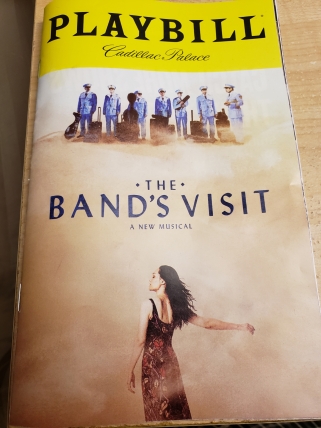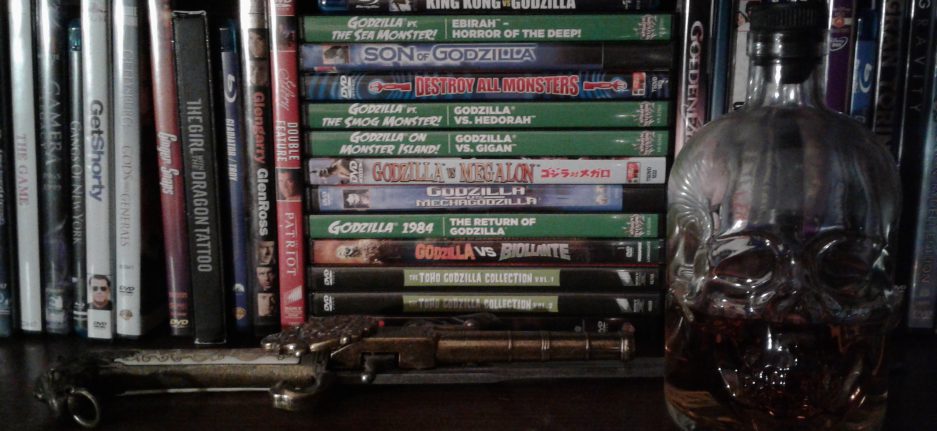The rotation of the Earth really makes my day.
I know it’s become customary to start these things off with a dad joke, but, really, one of the only ways I can think to open is with this: “You like Chet Baker?”

Like Jerry Seinfeld in Bee Movie, young Haled’s pick-up line involves jazz, and it’s delivered just as swarthily. Haled is the trumpet and violin player for the Alexandria Ceremonial Police Band, an Egyptian organization with a presumptively proud history but a relatively bleak outlook, as the powers-that-be are complaining about cost and efficiency with regard to continuing the group. Nevertheless, Haled and the band, led by the elder Tewfiq, embark on a trip to Israel to perform at the Arab Cultural Center in 1996. With no welcoming party, the band is left to their own devices in getting to their appointed show in Petah Tikvah (a city roughly the size of Rockford just east of Tel Aviv). Unfortunately, translating Hebrew through Arabic, even by way of mediating English, isn’t perfect: Arabic doesn’t contain a “P” sound, so when Haled arranges transport to their destination, he mistakenly gets the band sent out to Bet Hatikvah (a fictional town south of where they want to be, smack dab in the Negev no less). Stranded, the band is forced to rely on the kindness of the locals, including café owner Dina and out-of-work Itzik, who rally to provide shelter for the night. During the sojourn in the desert, the band members interact (mostly) warmly with their hosts: Dina and Tewfiq strike up a smoldering friendship of sorts, bonding over music and movies and what could have been with their significant others; Simon, the clarinetist and would-be conductor, joins Itzik’s family for an impromptu birthday celebration, complete with reminiscing, family in-fighting, and ruminations on disappointment; and Haled joins young Papi on a blind double date, teaching the kid about romancing the ladies in the process. With the new day comes the band’s exit to Petah Tikvah, everyone altered but little changed in the grander sense.
The Band’s Visit has a definite everyday melancholy about it. Like the band, the townsfolk of Bet Hatikvah have little to look forward to, and their individual levels of happiness are either in the past or fleeting bits of the present, the future gray at best. Itzik’s woes about family life decry the onset of complacency and the apparent foolishness of young love and its attendant optimism; meanwhile, Dina comes face-to-face with her current stagnant situation and realizes how lonely she is. On the other side, Simon’s vain desires of finishing his concerto and conducting mirror his host family’s fate of constant backburner-placing, and Tewfiq finds himself so bogged down in grief for his wife and child (whose deaths he attributes to himself) that he can’t fully connect with the clearly eager Dina, underlining his attachment to the band and its survival: the music is all that’s left of his once-thriving soul. There’s a general sense of loneliness, of longing for an uncertain and unlikely future, of a pessimistic pall being draped over just about everyone we see.
Funnily enough, there is also a sense that the future may yet hold some promise. On the individual level, Haled presses on with his come-ons regardless of being continuously shot down (though he and Dina do make that most physical of connections, so he knows he’s not completely hopeless), and even passes on some wisdom to the hapless Papi. A young man, shown ever waiting by the payphone for his girlfriend to call, finally gets the reward he’s been praying for near the end, his persistence shown to be clear of vanity. Even Itzik’s baby, despite having parents who have fallen into a cycle of fighting, has the love of family surrounding it. There’s also the overarching message that former seeming blood enemies like Egypt and Israel, whose political and armed conflicts are well-known by this point, can come together and help each other out, wallowing in a shared humanity, even if it isn’t in the brightest of circumstances. I don’t think it’s a coincidence that our fictional town’s name can be loosely translated as “Home of Hope” (people more experienced in Hebrew can feel free to correct me on that one as needed), showing us that grace and goodness can be found anywhere, even in the middle of the desert. Not a bad message, even if it feels awfully dark and somber at times.
Said message is communicated deftly by a fairly terse yet decidedly effective script from Eran Kolirin, who does double duty with a similar style of low-key direction, and a cast that knocks the material out of the park. Ronit Elkabetz’s turn as Dina is as bubbling with beneath-the-surface power as her character’s inner fire, and you can see the various emotions play across her face and body language in every scene. Sasson Gabai is very much subdued and nuanced as Tewfiq, illustrating his character’s inner turmoils and resulting outward awkwardness exceedingly well. And you can’t help but love Saleh Bakri as the smooth Haled, quietly smoldering in the oppressive heat and shadow of the desert and Tewfiq, respectively.
It’s an extremely well-done film all-around, and its themes are more universal than the chosen setting and characters would initially lead one to believe. Though I’m not entirely surprised that the story would be adopted for the stage, I certainly would not have expected such an adaptation to come in the form of a musical. But here we are, ain’t we?

The plot of the musical version is pretty much identical to that of the film, though a few tweaks here and there to the story are tossed in, like a longer stay in Itzik’s house, including a lullaby for the youngling, and a somewhat less definite climax (pun intended) to the burgeoning triangle between Dina, Tewfiq, and Haled. The town’s staid and overly placid lifestyle is underscored a bit more here, thanks to mentions in “Waiting” and “Welcome to Nowhere”, and Dina’s abiding love for Egyptian films, as presented in “Omar Sharif” (my favorite number of the show, no less, if for no other reason than providing a reference to Egyptian cultural icon Umm Kulthum, whom I learned about in undergrad), is given stronger prominence, as is Papi’s frustration with romance, as exhibited in “Papi Hears the Ocean”. It was also nice to see that Boney M’s disco cover of Bobby Hebb’s “Sunny” made it onto the stage during the roller disco scenes, ‘cause that’s a welcome jam regardless of the medium.
In terms of staging, the musical numbers, as mentioned, highlight and underline the inner emotional spaces of the characters, often just plainly putting them out for the audience to hear. It’s not a bad move, considering the stage isn’t the best method of delivering the subtlety of facial expression (though the film’s occasional use of awkward silences does translate rather well here, often leading to more laughter than before), and the band is given more of an opportunity to join in on the proceedings, providing musical accompaniment from just out-of-spotlight (not wholly unlike how the film Woman at War and bits of Birdman integrated their scores into the visual narrative with musician pop-ins). The rotating circle on stage, not entirely dissimilar from Hamilton’s use of spinning, not only allows for smooth transitions between disparate locations, but also serves to highlight the plight of the characters, caught on their own respective wheels of sameness, and the circle of life that’s progressing before our eyes the whole time.
Interestingly, though the same plot points and emotional notes are touched upon in both versions of the story, the musical comes across as much less dour, the hope clearer than the flower-springing-from-grime of the film. The humor, though still very much rooted in the subtle and mundane, is brighter on stage: There were more instances of me minorly guffawing in the Palace than at home with the DVD, and it felt more right to do so in that setting. The inherent charm of the story comes through more because of the musical numbers, rather than the film’s stark silence echoing the emptiness its characters exhibit throughout. Nonetheless, the story tugs at your heart in much the same way as the film, just from a slightly different angle of incidence. It doesn’t hurt that the cast here, including Chilina Kennedy burning things up as Dina and Sasson Gabai reprising his fantastic turn as Tewfiq for the stage (I didn’t even realize this until I bothered to look it up in the Playbill later on), is phenomenal, and the accompanying band is excellent (especially when finally allowed to let loose and jam at the end, a rousing finale to an already deeply satisfying production).
It’s kinda fascinating to compare the two methods of communication, film and stage musical, what with their different advantages and disadvantages and varying spins on the same narrative. One is darker, more subdued than the other, one is more elucidative of the characters’ inner workings, but both tell the story pretty much equally effectively. I don’t think I’ve seen such a direct comparison full of contrasts like this before, and I feel it’s a testimony to the power of the story itself that such a thing could be accomplished in the first place. I highly recommend both versions of the tale, though something tells me the film is much easier to come by. Either way, you’re bound to have a good time and spend a moment or two reflecting on your own life, for better and for worse.
